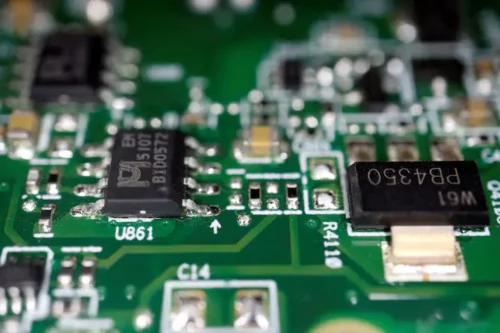The commerce ministry announced on Thursday that China will initiate an inquiry into the alleged damage caused to Chinese mature node chipmakers by U.S. government subsidies to its semiconductor sector.
In contrast to the state-of-the-art chips that drive artificial intelligence models, mature node chips are more cost-effective, simpler to manufacture, and employed for less intricate tasks, such as home appliances and communication systems.
The investigation is the most recent salvo in Beijing’s retaliation policy against Washington’s ever-expanding scope of restrictions targeting China’s semiconductor industry.
The Biden administration has alleged that the industry has the potential to dominate global supply chains and assist the Chinese military in exceeding its technological capabilities compared to the U.S.
“The Biden administration has given a large amount of subsidies to the chip industry, and U.S. enterprises have thus gained an unfair competitive advantage and exported relevant mature node chip products to China at low prices, which has undermined the legitimate rights and interests of China’s domestic industry,” the commerce ministry of China stated in a statement.

The China Semiconductor Industry Association issued a statement supporting the investigation shortly after the commerce ministry announced it.
The Biden administration’s CHIPS and Science Act, which in 2022 committed $52.7 billion in subsidies for U.S. semiconductor production, research, and workforce development, was deemed to have “seriously violated the basic laws of the market economy” by the association, whose board includes executives from the country’s largest chip companies.
The Biden administration’s rationale for announcing a tariff hike on all Chinese chip imports in September and a probe into China’s mature chip node industry last month, which U.S. Trade Representative Katherine Tai claimed had expanded capacity, artificially lowered prices, and hurt competition using Chinese state funds, is echoed in Beijing’s accusation.
Over the past three years, Washington has also implemented more stringent export restrictions to restrict the sale of advanced AI chips manufactured in the United States to China.
Intel (INTC.O), a U.S.-based supplier of mature node processors for the Chinese market, could be affected by the Chinese government’s inquiry, though the specifics of any potential retaliatory actions remain unclear.
Intel did not promptly address a request for comment.
Although China‘s semiconductor industry is generally inferior to that of the United States, Beijing is widely perceived to have responded to Washington’s chip restrictions by restricting the export of rare earth metals and initiating an investigation into the U.S. AI chipmaker Nvidia (NVDA.O) for alleged violations of its anti-monopoly laws.

Salman Ahmad is known for his significant contributions to esteemed publications like the Times of India and the Express Tribune. Salman has carved a niche as a freelance journalist, combining thorough research with engaging reporting.













